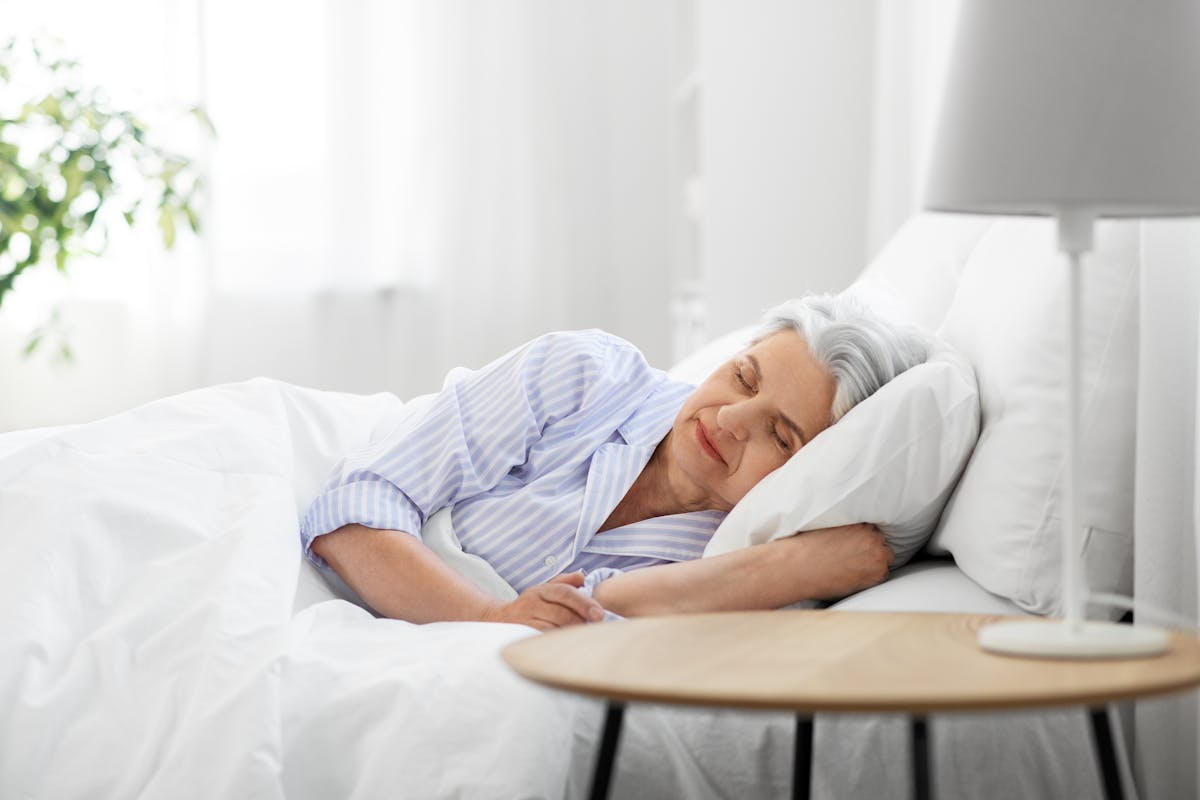How Much Sleep Do Seniors Really Need, and How Can You Get It?

Sleep and the problems associated with the lack of it often becomes a hot topic as we grow older. There’s no doubt about it, getting a good night’s rest becomes more difficult with age. That happens for a variety of reasons, ranging from medication side effects to a sedentary lifestyle.
If you or a senior loved one is struggling with insomnia, you might wonder just how much sleep we really need each night. Eight hours a day is the number most commonly batted around. But is that really the case? Let’s take a look at what we know about quality sleep and aging.
Sleep and Aging
How much sleep do experts say a senior needs? According to the Sleep Foundation, seniors should try to get between seven and nine hours a night, just like younger adults. There’s simply no solid evidence to back up the popular idea that older adults need fewer hours of slumber.
Despite knowing how much rest they should be getting, seniors often say they have difficulty falling or staying asleep. It leads many to give up trying and to accept that restful sleep just isn’t an option for them. Unfortunately, a number of negative health consequences are associated with a lack of quality sleep, including:
- Heightened risk for depression
- Unintentional weight gain
- Weakened immune system
- Greater odds of experiencing a fall
- Increased chance of developing diabetes and cardiac diseases
By contrast, the benefits of peaceful slumber each night are numerous. They include:
- Less risk of getting sick: Because restful nights are linked to a stronger immune system, getting the right amount of sleep can help protect against colds and other viruses.
- More energy: When your body and mind have a chance to rest and refresh on a regular basis, you’ll likely find your energy level increases. So does your ability to stay alert and active.
- Making better choices: Being well-rested can also result in making better lifestyle decisions. You are more likely to exercise and eat a healthy diet when you don’t feel tired and stressed.
- Fewer incidences of disease: Quality sleep lowers your risk for some types of disease, including diabetes, heart disease, and even some forms of cancer. Researchers aren’t exactly sure why, other than that getting enough sleep means you’re likely to make better lifestyle choices.
So, what can you do if you are experiencing sleep problems? The first step is to explore what’s causing your struggle. Here are some of the most common causes of insomnia and how to overcome them.
Tips for Sleeping Better at Night
- Optimize your sleep environment: Having a peaceful sleep environment might do the trick. Turn off your television and devices one hour before bedtime. Turn the thermostat down and pull the curtains so the room is dark. If it’s too quiet to rest, try using a fan or a white-noise machine.
- Create a routine: Sleep specialists also say it’s important to get in the habit of waking and going to sleep at the same times. An irregular schedule can disrupt the body’s natural circadian rhythms. Setting an alarm so you rise at the same time each day, even on weekends, might help.
- Get up and move: A sedentary lifestyle is linked to poor-quality sleep. Limiting the amount of time you spend sitting, combined with increasing your daily exercise, may improve your ability to get to sleep and stay there. It’s usually best to exercise early in the day, as evening exercise can stimulate the brain and keep you from nodding off.
- Limit late-day caffeine: Many of us rely on a cup or two of coffee to get rolling in the morning, especially after not resting well the night before. The caffeine can provide a little extra energy to start the day. But having too much caffeine or consuming it late in the day can contribute to sleep problems.
- Skip the alcohol: People often think enjoying a glass of wine before bedtime helps them unwind. While you may feel more relaxed, alcohol actually disrupts melatonin in the body. That upsets the body’s sleep-wake cycles. It can also worsen snoring and sleep apnea, both of which contribute to poor-quality sleep.
- See the doctor: If despite your best efforts, you still struggle to get a good night’s rest, it might be time to schedule an appointment with your primary care physician. They may be able to detect an underlying health condition that is keeping you awake.
Invest in an Emergency Response Device
If you are an older adult who lives alone, the fear of falling and not being able to get help might be keeping you awake at night. One way to improve your peace of mind is by investing in a mobile monitoring unit. These devices allow you to summon help with a simple press of a button. Call 1-844-203-5617 to learn more!